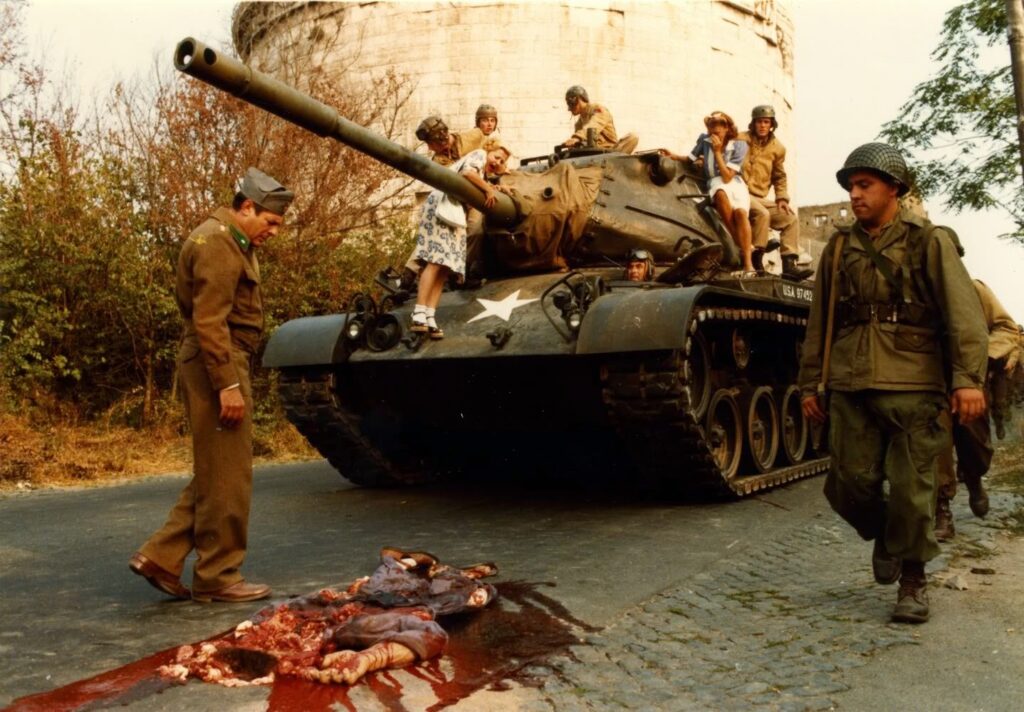
Liliana Cavani’s film La pelle (1981) is based on a novel of the same name by author Curzio Malaparte which was subsequently banned by the Catholic Church. The film, like the novel, deals with the moral ambiguities of the American occupation of Naples in 1944. La pelle follows Malaparte (Marcello Mastroianni), liaison between the Allied troops and the Italians, as he attempts to navigate his duties as an officer and his conflicting sense of national identity.
La pelle continued director Cavani’s inquiry into the nature and legacy of fascism in Italy. Like The Night Porter (1974), La pelle supposes that the commodification of the human body is a byproduct of fascism. In La pelle Italian bodies are literally devoured for food, sold as vessels of pleasure, and treated as raw meat in the wake of their “liberation”. The American forces who have come to Naples to liberate the city do little more than pilfer its resources and its people.
Malaparte, himself a former fascist, must aid the American General Cork (Burt Lancaster) in the occupation of the city, primarily by chauffeuring the wife of an American senator, Col. Deborah Wyatt (Alexandra King), around Naples and Capri. In this capacity Malaparte confronts Col. Wyatt with the true horrors of the occupation, dispelling her preconceived notions and shaming her own exploitative motives for having come to Italy. In the course of their combative encounters Malaparte takes Col. Wyatt to an avenue where mothers peddle their young sons for sex. Col. Wyatt is outraged by this, to which Malaparte responds “Better to sell them than to eat them”. Above all else La pelle is a portrait of systematic cruelty. At one point Malaparte says to an American G.I. “Did you come here to fight Germans or insult Italians?”
Cavani seems obsessed with the inherent hypocrisy of American valor. As Italians resort to cannibalism to survive, General Cork is having rare fish from the Naples aquarium served at princely dinners. A supporting character, the American Jimmy (Ken Marshall), falls in love with the innocent Maria (Liliana Tari) only to humiliate her and reject her when her father forces her into prostitution. Jimmy mourns to Malaparte “I was going to marry her”. Unchaste, Maria becomes worthless in the eyes of a G.I. who seeks out prostitutes every night. Even Malaparte’s beloved dog Febo falls victim to the occupation. When Malaparte finds his dog after Col. Wyatt let him loose, the animal is in a hospital as “practice” for army surgeons with his vocal cords severed so he cannot whimper since the doctors won’t waste anesthetic on a dog.
La pelle‘s brutalism is perhaps best summed up in its closing moments. As General Cork’s Fifth battalion enters Rome triumphantly the people of Rome rush out rejoicing. One man, with his son on his back, moves too close to an American tank and gets pulled under. Cavani channels Lucio Fulci for the effect of the body being squished beneath the massive machine with blood and guts spewing forth. The crowd cries out as Americans usher a news crew away from the scene. Malaparte stands over what remains of the Roman’s body, smeared across the cement road. Jimmy comes over to Malaparte and apologizes, to which Malaparte responds “Don’t be, you’re the winners”.
For Cavani there is no redemption, no moral lesson and no meaning at all to the violence of war. La pelle, made forty years after the events depicted therein, is helpless to offer any insights as history continues to repeat itself. All Cavani can do and does do is to show her audience this horror and hope that they never forget it. La pelle is a WWII films like Come & See (1985) where it’s simply enough to make the legacy of war visceral enough that viewers can, temporarily, engage in another country’s trauma.
